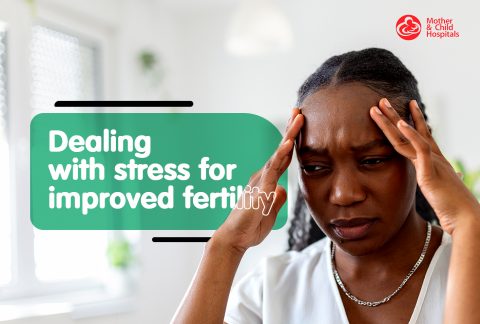-

How stress impacts fertility
How stress affects fertility & self-care tips
Stress has become an unavoidable part of everyday life. Stress is how the body responds to changes (pressure) physically, emotionally, and mentally. Stress can be positive (a new job pushing you to stretch yourself) or negative (losing contact with loved ones).
In this blog post, we will explore the connection between stress and fertility and provide strategies for managing mental health to improve your chances of conception.
Understanding the Stress-Fertility Connection:
Stress can push people toward unhealthy habits that affect fertility. Chronic stress can disrupt the hormonal balance necessary for ovulation and sperm production, causing irregular ovulation or reducing sperm count and motility.
Mind-Body Techniques for Stress Reduction:
Practice journaling and meditation to remind yourself of the good things you have going on. Gratitude uplifts your mood. You can also explore yoga and deep breathing exercises as effective stress-reduction methods.
Lifestyle Changes:
A balanced diet, regular exercise, and adequate sleep reduce stress. In contrast, intake of alcohol, caffeine and smoking add to stress and reduce fertility. Explore natural endorphin hormone-boosting activities, like massage and sports, that help you feel good.
Seek Professional Help:
At Fruitful Field, we provide counselling for those going through fertility treatment. We encourage individuals and couples to consult mental health professionals if stress severely affects their fertility journey. Our fertility solutions include IVF treatment through Intracytoplasmic Sperm Injection (ICSI), Intrauterine Insemination (IUI), Semen Freezing, Gender Selection, Cryopreservation (Eggs & Embryos), and Transport IVF.
The Importance of Emotional Support:
When we have good relationships, it supports our emotional health.
Don’t blame your self or your partner for not conceiving or delivering. Instead eliminate mental stress by leaning on your loved ones, and tackling the causes. Communicate regularly with support groups, and stay accountable to your health providers during fertility struggles.
Conclusion:
Stress is a common factor that can negatively impact fertility, but it’s not insurmountable. By adopting stress-reduction techniques, making lifestyle changes, and seeking professional help, individuals and couples can better manage their mental health and increase their chances of conceiving.
To book a consultation with a fertility specialist and take your journey towards success, click here or call +234 812 920 9860.
Mother and Child Hospital
Healthy Family, our Mission | Contact us on +2347036202190 or +2347068372987
